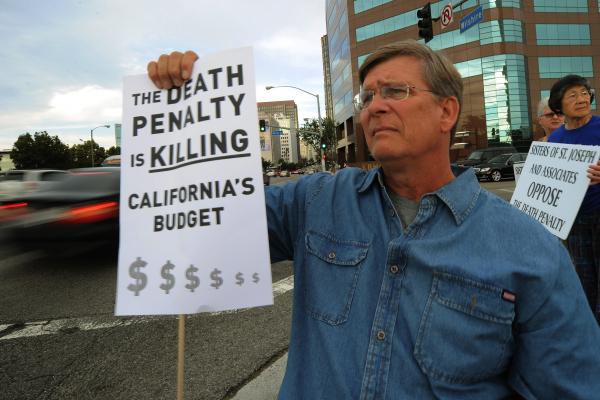October was Interfaith Month for Prop 34, a time set aside for leaders of faith traditions to address the question of California’s death penalty and advocate for its replacement. Hundreds of faith community’s have endorsed Proposition 34 because we believe the best way to do justice in California is to replace the death penalty with life in prison with no possibility of parole.
The will to see justice done is deep within the human spirit. We may not always agree on what “justice” looks like, but the belief in a just and fair society — and the desire to bring it about — are at the heart of how we live together and form a community. In religious traditions like Christianity, Islam, Judaism, and countless others, doing justice is a calling to enact God’s will.
The next question is, of course, what does that mean? Discerning justice can be even harder than doing justice.
Despite our differences, daunting though they sometimes seem, the religious traditions we represent all agree that voting “yes” on Proposition 34 to replace the death penalty with life in prison without parole will advance the cause of justice in California. Yes on 34 to replace the death penalty is justice that works for everyone in our community.
There are few times when our view of justice is so clear and unequivocal, but this is one of those times — and not only for the reasons you may expect.
First and foremost, we agree that needlessly ending human life is never justice. The death penalty is particularly needless in California, where we have a safe, secure, and affordable alternative. Life in prison with no possibility of parole is proven to work and keeps our communities safe, and it wastes fewer resources than the death penalty.
The death penalty also risks the horrific possibility of the state executing an innocent person — a risk we cannot accept. More than 140 people have been exonerated from death row after proving they were wrongfully convicted. Just last month, DNA evidence proved Damon Thibodeaux had spent 15 years on death row for a murder he did not commit. He was the 300th person exonerated by DNA.
There is compelling evidence that we have already executed innocent people. Cases like Cameron Todd Willingham, Carlos DeLuna, and Troy Davis leave us deeply troubled.
But discerning justice for California often focuses our attention on more mundane questions: what is justice that we can afford? Some people avoid talking about dollars and cents when debating questions of life and death and justice — but we are not among them.
In our religious traditions, faithful stewardship of our resources is a vital part of doing justice in the world. California voters must decide how to invest their scarce tax dollars, and their choices will be a reflection of our shared priorities as a community. Currently, the pursuit of executions comes at a staggering cost — and at the expense of real public safety.
Many people are shocked to learn that California’s death penalty costs more than life imprisonment with no possibility of parole, but study after study has confirmed it — most recently by the Legislative Analyst’s Office, which projected voting “yes” on 34 will save $130 million every year.
The reality is that with the ever-looming risk of executing an innocent man or woman, the legal process required to execute an inmate requires massive costs. When prosecutors seek the death penalty, trial lengths are more than doubled, housing costs are more than tripled, and appeals stretch to 25 years or more. And after all that time and money, only 1 percent of death-row inmates are actually executed while most die of old age.
While we waste hundreds of millions of dollars on a death penalty that isn’t working, California also faces a crisis of unsolved crime. On average 46 percent of all homicides in California go unsolved each year, and 56 percent of reported rapes go unsolved. When voters face Prop 34 on the ballot tomorrow, they’ll have to ask whether they want their resources invested in solving crimes and bringing justice to everyone, or in continuing to pursue executions at a snail’s pace for a massive cost.
The question of where to invest our tax dollars is integral to doing justice. All faith traditions offer a vision of justice for everyone, and bringing it about demands that we use our resources wisely. Continuing to waste money on a dysfunctional death penalty is simply unwise.
Proposition 34 represents justice that works for everyone. By replacing the death penalty with life in prison with no possibility of parole, Prop 34 is the only way we can ensure that our state never executes an innocent person. At the same time, it saves $130 million and directs of a portion to local law enforcement to solve more rape and murder cases each year.
Prop 34 saves tax dollars, protects innocent lives, and keeps our communities safe. In the difficult task of discerning justice and enacting God’s will in our world, this decision seems surprisingly easy. The faith communities we represent — along with hundreds of others throughout California — endorse YES on Prop. 34.
Rt. Rev. Jon Bruno - Bishop Diocesan, Episcopal Diocese of Los Angeles
Rabbi Jonathan Klein - Executive Director, Clergy & Laity United for Economic Justice (CLUE)
Rt. Rev. Alexei Smith - Ecumenical & Interreligious Officer, Catholic Archdiocese of Los Angeles
Shakeel Syed - Executive Director, Islamic Shura Council of Southern California
Rev. Felix Villanueva - Conference Minister, Southern California Nevada Conference, United Church of Christ
Got something to say about what you're reading? We value your feedback!
